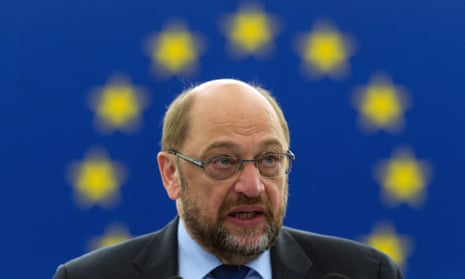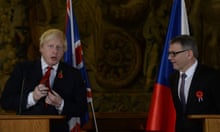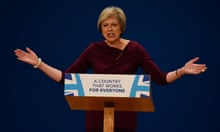The president of the European parliament has called on Theresa May to start Britain’s EU divorce talks after the summer, as pressure mounts on the incoming prime minister to spell out her Brexit plans.
Martin Schulz, the German Socialist MEP, put May on notice that her government must give “the utmost consideration” to MEPs, who have the power to veto the UK’s EU divorce treaty and any future trade deal.
But, writing for the Guardian, Schulz also struck a more conciliatory note, calling for talks to begin “without rancour” and for Britain to be thought of as a beloved relative leaving home rather than a treacherous renegade.
“Now that the country has full clarity on its new prime minister, after the summer I expect the British government to notify its intention to withdraw the UK from the EU,” Shulz said. “Talks must then start without rancour.”
Adopting a less confrontational tone from the EU institutions, which have taken the toughest line on Brexit since last month’s vote, Schulz says: “The UK should not be treated as a deserter but as a family member who is still loved but has decided to go in another direction.”
Weeks before the referendum, the president of the European commission, Jean-Claude Juncker, declared that “deserters” would not be welcomed back with open arms. The EU machine has also been strongly critical of the UK government’s foot-dragging over starting the formal EU exit process by triggering article 50.
Theresa May, who will take office on Wednesday, has said she will not trigger article 50 before the end of the year, in order to give the British government time to work out its negotiating strategy. On Tuesday, Philip Hammond, the foreign secretary, said it could take as long as six years for the UK to extricate itself from the EU.
After consulting lawyers, EU officials have acknowledged they have no power to compel the UK to trigger article 50. But the European parliament will help determine the final outcome of the divorce.
In his Guardian article, Schulz underlined this point by warning that MEPs could veto the final Brexit agreement, meaning the UK could be forced out of the EU with only its World Trade Organisation membership to fall back on. A weighted majority of EU governments will also need to approve the Brexit deal.
Falling out of the EU without a trade deal would mean a tariff wall would go up between the UK and rest of Europe. Although average tariffs are low, some could prove punishing, such as 10% on cars and 35% on dairy products.
EU leaders, past and present, have lined up to stress the UK cannot have access to the single market without accepting the free movement of people, a point repeated by Angela Merkel.
The task of the new prime minister will be “to get clarity on the question of what kind of relationship Britain wants to build with the European Union,” the German chancellor said on Tuesday.
In recent days, Merkel has warned that Britain will not be able to cherry-pick the bits of the EU that it wanted. The European parliament will be a firm defender of this line. “It is clear that there can be no better deal with the EU than EU membership,” Schulz writes.
But he adds that the EU must learn from the result of the referendum, although he warns against over-interpreting it, because of the “mass brainwashing” of the tabloids and and the leave campaign’s “force-fed intolerance of the foreigner”.
Schulz acknowledges that many people voted to leave because they felt left behind by globalisation and calls for a reset in which the EU recommits to “what people need”. Implying that the EU as a guarantor of peace is no longer enough, he writes: “Today it is about safeguarding wellbeing, social justice, and protecting our values in a globalised world.”
Schulz, who has led the European parliament since 2012, is campaigning for an extension of his term later this year, when several big EU jobs come up for review. In a joint-interview alongside Schulz, Juncker told Der Spiegel he was backing the German Socialist to stay in office for the sake of stability, despite they fact they are from different political families – Juncker is a member of the centre-right EPP group, while Schulz is on the centre-left.
Juncker is expected to write to the new British prime minister on Wednesday to express his congratulations.










